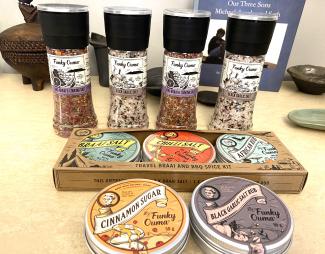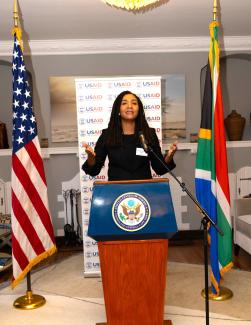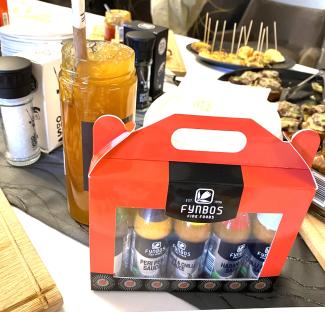Cape Town, South Africa
Good afternoon, good evening, hello everyone!
Thank you, Consul General Haskell for the incredible hospitality here in Cape Town.
Leslie, Troy – thank you for your leadership of USAID’s work in South Africa and across the Southern Africa region.
I’d also like to recognize the hard work and leadership of our Mission’s Regional and Economic Growth Office, as well as our implementing partners. We are here in large part because of them and their vision for how USAID can work with the world class exporters in the Western Cape to expand trade between the U.S. and South Africa. Thank you!
We’ve been looking forward to this evening’s reception since we landed in Johannesburg on Monday. A veritable who’s who of the Western Cape export industry, and our own South African fancy food show? One of each, please!
I think I hear the sound of our flight back to Washington being delayed, so perhaps we can do this again in a couple of days?
In all seriousness, I am humbled and excited to be with all of you. From the moment we touched down in Johannesburg, the energy was contagious.
Over the past three days, we’ve been met with such enthusiasm at each stop on our journey. The energy that we have felt from both our civil society and private sector partners is, I believe, actually, a sense that with just the right amount of support; just the right connection or conversation… USAID partnerships can be a launch pad for prosperity.
That’s the idea behind the Prosper Africa initiative and USAID’s Africa Trade and Investment Program—to leverage resources and convening power; raise awareness of investment opportunities; lower transaction costs and mitigate risk; and to generate positive social, economic, and environmental impact.
Through USAID Southern Africa and the dedicated work of the Regional Economic Growth Office, businesses and investors across the continent are able to access the U.S. government’s trade and investment services and resources—from market insights to deal support, financing, and the tools to strengthen the climate for businesses locally.
We’ve known for a long time that Africa’s success and prosperity is essential to building a better future for everyone, not just Africa. The continent is home to half of the world’s fastest growing economies. Over the next twenty years, the size of Africa’s workforce is projected to surpass those of India and China. And at a time when the rest of the world is growing older, Africa’s workforce is getting younger.
So, while we’re committed to supporting inclusive economic growth and development, and expanding trade opportunities here in South Africa and across the continent, it’s not simply out of a sense of altruism. More trade opportunities for South Africa also means more competition, lower costs, and jobs for the American economy.
Since Prosper Africa launched in 2019, the United States has helped businesses and investors close hundreds of deals across more than 40 African countries, creating tens of billions in exports and investments, and generating thousands of jobs at home and abroad.
And as many of you know, these deals are having a real impact on South African lives and livelihoods.
Some of you traveled to New York this past June to attend the Summer Fancy Food Show, which brought together 30,000 specialty food and beverage industry professionals.
Partners supported by USAID that attended the trade show were able to close deals worth a combined $4.4 million dollars. And I understand there are more deals in the pipeline amounting to more than $14 million dollars.
To give you a sense of how this works—and how transformative these deals can be—let me tell you about the Wonderful Pomegranate, presented to us this evening by KarooPak in the form of a refreshing beverage.
The Wonderful Pomegranate is a valuable, water-wise crop sold in supermarkets around the world. The seeds from the process-grade fruits can be removed and exported as a separate product. Its protein-rich peel can be used for animal feed. The oils extracted are used in beauty products. And they are processed for juices, ports, wines, and craft beers.
When KarooPak’s founder learned that the desert-like climate of the Klein Karoo valley —marked by long, hot summers and plummeting night temperatures just before the March harvest—was suitable for the high-demand variety of Pomegranate, they got to work cultivating and building the KarooPak brand from scratch.
KarooPak joined other USAID-supported exporters at the Fancy Food Show in New York in June, and because they were anticipating a grant of nearly half a million dollars from USAID to expand their packhouse and launch a range of new products, they were able to lock in deals to export more than $4 million dollars’ worth of goods to the United States.
And, as a result of the company’s growth and promise, including hundreds of jobs, municipal government partners have committed to improving roads and water access – they are even exploring the construction of a new dam that will supply water to the next phase of Karoo’s growth.
These deals forged through USAID’s Africa Trade and Investment Program are not symbolic. They are material proof of the commitment we’re making to one another, business to business, people to people. They support job growth and sustainable development for rural communities like those in the Klein Karoo.
Finally… access to global markets is crucial, but I also recognize it’s not the only constraint you face. As producers and entrepreneurs, you all need affordable, reliable electricity to operate and to employ people to make these amazing products.
We’re working to support the continent on this front as well, through the Power Africa initiative. We celebrated 10 years of Power Africa earlier this year. All told, this initiative has helped deliver new or improved electricity to more than 172 million people living and working in sub-Saharan Africa. And we’re building on that momentum.
The United States, USAID… and I, personally… believe deeply in the potential of the people of this continent. And we at USAID are serious about turning our belief into action and opportunity, so that together, we can write a new chapter in the story about the United States and Africa—one based on trade, not just aid.
With that, I’ll yield the floor. I look forward to hearing more of your stories.

USAID Southern Africa

USAID Southern Africa

